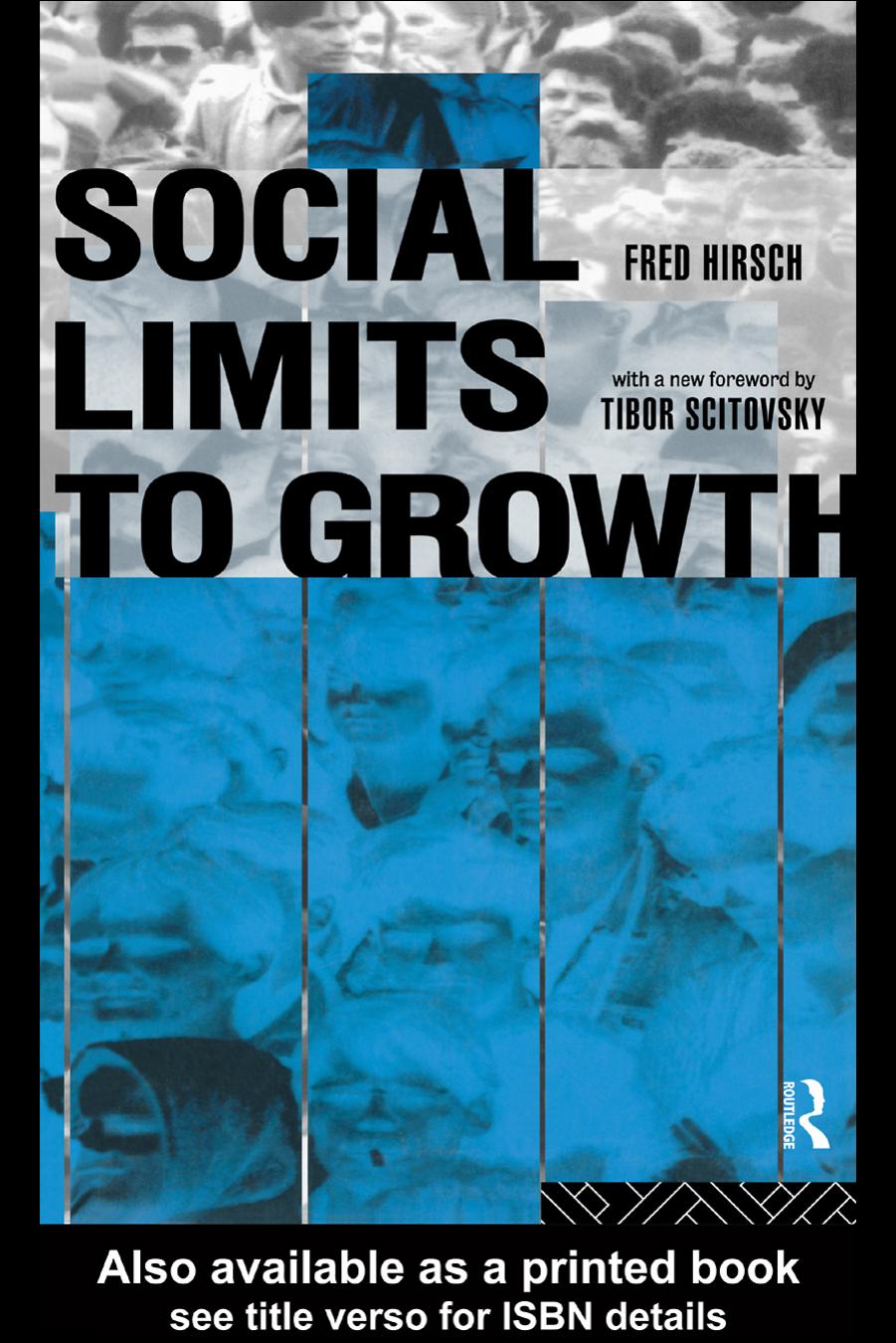Social Limits to Growth by Fred Hirsch

Author:Fred Hirsch
Language: eng
Format: epub, pdf
ISBN: 978-1-134-81217-2
Publisher: Routledge
1 D.H.Robertson, âWhat Does the Economist Economize?â in his Economic Commentaries (London: Staples, 1956). In the same spirit, Arrow has written: âWe do not wish to use up recklessly the scarce resources of altruistic motivation.â âGifts and Exchanges,â p. 355. This conception rests on the questionable premise that altruism is a depleting stock rather than a self-generating flow feeding partly on itself. Contrast John Stuart Mill, a propos unselfish feelings: âthe only mode in which any active principle in human nature can be effectually cultivated is by habitual exercise.â âUtility of Religionâ (1874), Collected Works, X (Toronto: University of Toronto Press, 1969), p. 423. The Titmuss school in Britain a century later took essentially the same view.
2 Paul A.Samuelson, âSocial Indifference Curves,â Quarterly Journal of Economics (February 1956).
3 G.A.Akerlof, âThe Market for âLemonsâ: Qualitative Uncertainty and the Market Mechanism,â Quarterly Journal of Economics (August 1970).
4 Compare Staffan Linderâs lament for the passing of the cinq à sept (Linder, The Harried Leisure Class, p. 85) and Wilfred Beckermanâs economic explanation of ministerial demand for call girls (âSex and the Falling Rate of Profit,â New Statesman, July 20, 1973).
5 Becker, âA Theory of Marriage.â Becker cites this influence as an economic explanation of the greater instability of marriages of blacks in the United States, as against Moynihanâs more familiar cultural/historical explanation. Rather than as cultural hangover for a deprived group, the more frequent break-up of black families appears on this analysis as a precursor of what economic advance and reduced sexual discrimination has in store for us all.
6 Hugo G.Beigel, âRomantic Love,â American Sociological Review (June 1951).
7 Sen, On Economic Inequality.
8 One of the few references to this aspect that I have found in the literature occurs as an endpiece to Arrowâs well-known analysis of the inefficiency of commercial provision of health insurance: âThe economic importance of personal and especially family relationshipsâ¦is based on non-market relations that create guarantees of behavior which would otherwise be afflicted with excessive uncertainty.â Kenneth J.Arrow, âUncertainty and the Welfare Economics of Medical Care,â American Economic Review (December 1963), pp. 941â973.
9 John H.Gagnon, âProstitution,â International Encyclopaedia of the Social Sciences, vol. 12 ( London: Macmillan, 1968), pp. 592â597.
Download
This site does not store any files on its server. We only index and link to content provided by other sites. Please contact the content providers to delete copyright contents if any and email us, we'll remove relevant links or contents immediately.
International Integration of the Brazilian Economy by Elias C. Grivoyannis(111059)
The Radium Girls by Kate Moore(12028)
Turbulence by E. J. Noyes(8050)
Nudge - Improving Decisions about Health, Wealth, and Happiness by Thaler Sunstein(7707)
The Black Swan by Nassim Nicholas Taleb(7129)
Rich Dad Poor Dad by Robert T. Kiyosaki(6633)
Pioneering Portfolio Management by David F. Swensen(6301)
Man-made Catastrophes and Risk Information Concealment by Dmitry Chernov & Didier Sornette(6019)
Zero to One by Peter Thiel(5802)
Secrecy World by Jake Bernstein(4753)
Millionaire: The Philanderer, Gambler, and Duelist Who Invented Modern Finance by Janet Gleeson(4478)
The Age of Surveillance Capitalism by Shoshana Zuboff(4293)
Skin in the Game by Nassim Nicholas Taleb(4250)
The Money Culture by Michael Lewis(4207)
Bullshit Jobs by David Graeber(4190)
Skin in the Game: Hidden Asymmetries in Daily Life by Nassim Nicholas Taleb(4007)
The Dhandho Investor by Mohnish Pabrai(3765)
The Wisdom of Finance by Mihir Desai(3748)
Blockchain Basics by Daniel Drescher(3583)
